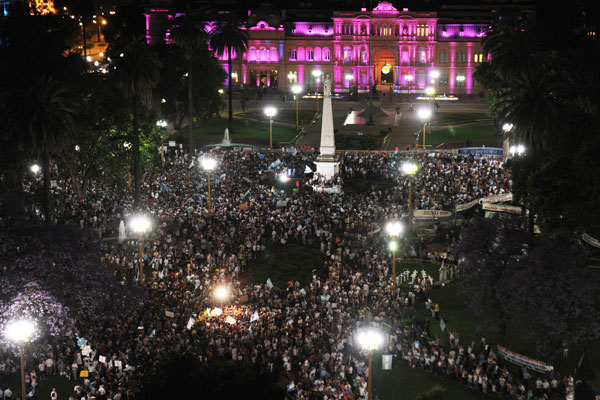Newscom
On Sunday, Argentinians will go to the polls to select their candidates for the country’s upcoming legislative elections. Though it may seem trivial, the open primaries will in fact be the first step in an election that is likely to prove critical to the fate of democracy and freedom in Argentina.
Late last year, Argentinian President Cristina Fernández de Kirchner sparked protests across Buenos Aires when she suggested changes to the constitution to allow her to run for a third term. The move would require a vote by a two-thirds majority in both the Chamber of Deputies (Argentina’s equivalent to the House of Representatives) and the Senate.
At the moment, Kirchner’s party, the Frente para la Victoria (Front for Victory, or FPV), and its allies control both houses. Half of the seats in the Chamber and one-third in the Senate will now be up for reelection. The vast majority of the open seats, at least in the Chamber, are currently held by the opposition.
Opposition parties in the Chamber will have to repeat their exceptional performance from 2009, when they last defeated the FPV, simply to maintain the status quo. The FPV doesn’t have to work nearly as hard to further extend its control of the legislature and give Kirchner a larger majority with which to push further leftist and authoritarian reforms.
Already, in her first six years in office, President Kirchner has made numerous assaults on democracy and freedom in her country. Indeed, as Wall Street Journal columnist Mary O’Grady explained, “Mrs. Kirchner has made no secret of her admiration for the [Hugo] Chávez model of governance.”
In February, the Kirchner government was censured by the International Monetary Fund for cooking the statistical books and underreporting rampant inflation, allowing the government to pocket an extra $6.8 billion. The country has also been working hard to dodge its debt. Unsurprising, really, that the country is ranked 160 out of 177 in the Index of Economic Freedom.
In April, with the outspoken support of President Kirchner, judicial reforms were passed that legal analysts warn will grant extensive control over the legislature. The reforms included limits on court injunctions that can be made in cases against the state and changes to how members are selected to the body that oversees the federal courts.
These reforms came in lockstep with Kirchner’s attempts to weaken el Grupo Clarin, the country’s lone independent telecommunications outlet and one of the few remaining sources of print media able to voice opposition to the “Kirchnerists.” Then, of course, there are also the repeated attempts of the Kirchner administration to claim control of the Falkland Islands, despite a referendum held on the island in March in which 99.8 percent of the residents voted to remain under British rule.
The primaries on Sunday are part one of a saga that may prove critical for the nation. If the FPV expands its majority, Kirchner may be able to amend the constitution and run for a third term. Given her attempts to trample democracy and freedom so far, the last thing Argentina—or the international community, for that matter—needs is another four years of Cristina Kirchner.
Source material can be found at this site.










